| Monday, October 31, 2016 |
| DAY 1: MAKING THE MOST OF THE COMMON MARKET |
| 8:00 |
Registration
|
| 9:00 |
EAC Anthem
Opening Remarks
Hon. Jesca Eriyo, Deputy Secretary General, Finance and Administration, EAC
- Mr. Abebe Aemro Selassie, Director, African Department, IMF
presentation
-
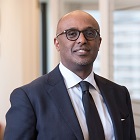
Mr. Abebe Aemro Selassie is the Director of the IMF’s African Department, with responsibility for the Fund’s operations and engagement with the 45 member countries from sub-Saharan Africa. He assumed this role in September 2016. Prior to this assignment, Mr. Selassie was Deputy Director of the Department. Between 2011 and 2013, he was in charge of the IMF’s work on Portugal under its IMF/EU/ECB-supported adjustment program (2011-13). From 2009 to 2011, he was the mission chief for South Africa, leading the Article IV discussions with the government, and Chief of the African Department’s Regional Studies Division. From 2006 to 2009, Mr. Selassie was the IMF’s Senior Resident Representative in Uganda. Earlier in his career, he worked on the Fund’s lending programs with Turkey (1999-2001), Thailand (1998-99), Romania (1997-98) and Estonia (1996-97) as well as taking part in extensive policy, operational review, and economic research work. Before joining the IMF in 1994, he worked for the Government of Ethiopia (1992-94) and the Economist Intelligence Unit in London (1991-92). An Ethiopian national, Mr. Selassie did his graduate studies at the London School of Economics.
- Mr. Roeland van de Geer, Head, EU Delegation to Tanzania and the EAC
-
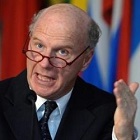
Ambassador Roeland van de Geer was born in Amsterdam, The Netherlands, on 19 February 1953. He graduated in Political Sciences and Public Administration from the Free University in Amsterdam (1970-1978). Aside from his diplomatic career, the Ambassador has a long relationship with Africa. He was previously a lecturer, research fellow and project manager of a Free University of Amsterdam Public Administration Research and Curriculum Development Project with the National University of Lesotho (February 1978-December 1980) and an advisor on local government and decentralization for the World Bank Maseru Urban Development Project in Lesotho (January 1981-January 1982). Before taking over his current position in February 2011, the Ambassador was the Special Representative of the European Union for the Great Lakes Region (since March 2007). Previously, he served as Ambassador of the Netherlands in Afghanistan (August 2006-February 2007) and Mozambique (September 1994-August 1998). Previous to his posting in Afghanistan, the Ambassador was Africa Director at the Ministry of Foreign Affairs of the Netherlands (February 2002-August 2005). He also held other positions in the Dutch Foreign Affairs Ministry with a focus on Africa: Head of the Southern Africa Division – Development (February 1991-August 1994); Head of the Middle East and Northern Africa Division (February 1990-January 1991); Head of the Southern Africa Division – Political (September 1984-December 1986); Desk Officer for South Africa, Botswana, Lesotho and Swaziland (February 1982-August 1984).
|
9:45
|
Session 1: Keynote Address
Economic Integration in the EAC: Main Steps and Potential Gains
Speaker:
- Hon. Nuwe Amanya Mushega, (former EAC Secretary General), Uganda
-
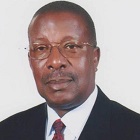
Mr. Nuwe Amanya Mushega, commonly known as Amanya Mushega, is a Ugandan lawyer, politician, diplomat, and civil servant. He served as the secretary general of the East African Community (EAC) from 2001 until 2006. He was born on 27 June 1946 in Bushenyi District in the Western Region of Uganda. Mr. Mushega received his early education in Uganda. He attended Mbarara High School from 1963 until 1966, before transferring to Kings College Budo in 1967. In 1969, he entered the University of Dar es Salaam to study law. He obtained his Bachelor of Laws degree in 1972 and his Master of Laws degree from Queen's University in Kingston, Ontario, Canada in 1974. In September 1978, Mr. Mushega enrolled in the Doctor of Philosophy program at the London School of Economics but abandoned that program when he joined the National Resistance Movement in 1981. Following his graduation from the University of Dar es Salaam, he returned to Uganda in 1972 and taught as an assistant lecturer in the faculty of law at Makerere University. After obtaining his master's degree in 1974, he became a lecturer in the faculty of law at the University of Zambia in Lusaka. He also worked as a Research Fellow with the Zambia Law Reform Commission from 1976 to 1978. He returned to Makerere University in 1979 as a lecturer and continued in that capacity until 1981. In 1981, Mr. Mushega joined the National Resistance Army of Yoweri Museveni, where he served as the chief national political commisar and rose to the rank of colonel. Between 1986 and 2001, he served in various ministerial roles, in the ministries of defense, local government, education, and public service. During that time, he also served as the member of parliament representing Igara East in Bushenyi District. He was elected member of the Constituent Assembly that made the 1995 Uganda Constitution. In 2001, he was appointed by the EAC heads of state to serve a five-year term as secretary general of the EAC. After leaving the EAC, Mr. Mushega returned to Uganda and, along with others, started Mushega & Associates Consultants, a private consulting firm. Mr. Mushega was also Deputy President of the FDC party until 2015. He currently holds no political office. Early last year he was appointed on the Panel of EAC eminent person to work for peace in Burundi. He is also a farmer in Bushenyi.
Objective: Assess the current state and pace of economic integration since the inception of the customs union and the common market, helping to set the stage for the more closely focused sessions to follow.
Speech: 30 minutes
Q&A with conference participants: 15 minutes
|
| 10:30 |
Coffee Break
|
| 11:00 |
Session 2: The Customs Union and the Common Market: What Has Been Achieved and What Are the Remaining Challenges? Views from the Private Sector
Moderator:
- Eng. Patrick Obath, Associate Director, Adam Smith International Africa Limited, Kenya
-
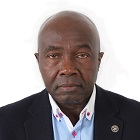
Eng. Patrick Obath is an Associate Director at Adam Smith International Africa Limited (ASI). ASI is an award-winning professional services business that delivers real impact, value and lasting change through projects supporting economic growth and government reform internationally. He is also Managing Consultant for Eduardo Associates, a private practice consultancy in Energy, Extractive Industries, and Engineering with special emphasis on Leadership, Governance and Sustainability. Eng Obath has held many management positions in Shell and Shell advised companies in Kenya, United Kingdom, The Netherlands and Malaysia working in the areas of general management, distribution, engineering and sustainability. Patrick joined the oil industry in 1976. He has wide experience in management at the international level and extensive experience in social, government and development issues and is a regular resource person on governance, leadership and sustainability issues in both Kenya and across Africa. He is currently engaged in extensive local and international consultancy for the emerging and exciting Extractives sector in Kenya working with Adam Smith International and various international development agencies. Eng Obath has been involved intimately in the business community in Kenya and East Africa at the top level since 2005 and is a past chairman of the Kenya Private Sector Alliance (KEPSA), sits on the boards of several Business Member Organizations and is a member of the National Economic and Social Council of Kenya – a presidential think tank. He holds a BSc. in Mechanical Engineering from Nottingham University and is a Member of the Energy Institute (UK), the Petroleum Institute of East Africa and the Institution of Engineers in Kenya. He is Chairman of PZ Cussons EA Ltd, African Alliance Kenya Investment Bank and General Plastics Limited and is a Non-Executive Director in companies involved in banking, oil and gas, manufacturing, international development, automotive, FMCG and ICT sectors. He is a Fellow of the Aspen Global Leadership Network (AGLN) and the African Leadership Initiative (ALI). He has been awarded several national recognitions in Kenya.
Panelists:
- Mr. Frank Matsaert, Chief Executive Officer, TradeMark East Africa, Kenya
-

Frank has over 20 years of experience as a senior private sector development specialist with an extensive track record in strategy, programme delivery and management in fourteen countries in Africa and six in Asia. Frank has been the Chief Executive Officer of TradeMark East Africa since October 2010 and prior to this was a private sector adviser for DFID and Country Director for Care. Frank started his career in the financial sector, as an International Fund Manager and Investment Analyst in the UK. Over the years Frank has designed and overseen over 40 major innovative and successful programmes totalling over $1 billion in the fields of trade, financial sector development, privatisation, investment climate reform, market development and skills development. Frank holds two Masters degrees in Economics and Archaeology, and is an IMRO certified Fund Manager.
- Ms. Lilian Awinja, Executive Director, East African Business Council, Tanzania
-

Lilian has a broad experience in EAC Regional Integration Advocacy, Marketing, Public relations and coordination of businesses in East Africa, to fully participate, take advantage of the benefits of EAC Integration and influence policy reforms at regional and national level. Keen on engagement through public private dialogues bringing together the EAC Secretariat, National Ministries of Trade and EAC Affairs, Trade Facilitation agencies and Chief Executive Officers of businesses with multiple stakeholders to ensure that the voice of business is heard continuously within the policy making circles in implementing the EAC Common Market, the Customs Union and the Monetary Union.
Lilian recently became the Chief Executive Officer of the East African Business Council having worked with EABC as Membership Development Manager and Communications Specialist. She understands the needs of the private sector in taking advantage of the wider EAC Common Market. With a broad and strong knowledge of the EAC region and with hands on experience in establishing and maintaining relationships with multiple stakeholders and policy makers across the Community, business sectors, individual corporate companies and women entrepreneurs Lilian is set to take EABC to the next level. She holds a Bachelor of Arts from Moi University in Kenya and a Masters of Sociology from the University of Nairobi.
Objective: Provide a private-sector perspective from the ground on what has been achieved so far and what the remaining obstacles are to doing business across borders in the EAC. Discussion should cover goods as well as services (including financial) and labor mobility.
Panel discussion: 55 minutes
Q&A with conference participants: 35 minutes
|
| 12:30 |
Lunch Break
|
| 14:00 |
Session 3: Fostering Regional Trade: What Can Be Done?
Moderator and Panelist:
- Ms. Doris Akol, Head, Uganda Revenue Authority, Uganda
-
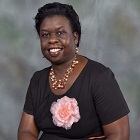
Doris Akol is a lawyer and administrator and currently serves as the CEO - Commissioner General at the Uganda Revenue Authority. She is a Fellow of the Institute of Chartered Secretaries and Administrators UK and a member of the Uganda Law Society and East African Law Society. She is a recipient of the ICSA Ralph Bell Prize for June 2008. Doris has extensive experience in domestic and international taxation practice, legal advisory services as well as practice and management of litigation of cases. She also has extensive experience in legislative drafting and review of public sector policies and legislation. As the Commissioner General of Uganda Revenue Authority she is charged with the responsibility of overseeing Tax Administration and collection of Tax and Non tax revenue for Government of Uganda. In her first year as Commissioner General, URA was able to collect surplus revenue of 139 billion, the first ever in the history of URA. She headed the URA team that successfully delivered the landmark victory by the Government of Uganda against Heritage Oil and Gas Limited and also negotiated a tax settlement of USD 250m by Tullow Oil Uganda Operations Pty Ltd.
Panelists:
- Mr. Richard Kamajugo, Senior Director, TradeMark East Africa, Kenya
-
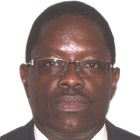
Mr. Richard Kamajugo is Senior Director, Trade Environment, at Trademark East Africa (TMEA). As a member of the senior management team at TMEA and the strategic objective leader for the enhanced trade environment in East Africa, his portfolio covers Trade Policy and Facilitation (including Customs); development and ensuring coherence of policies in implementing cross border product Standards and Sanitary measures for exports from East Africa; improvement of trade and customs systems and processes in the region through automation, and ensuring the smooth movement and efficient clearance of goods in ports and inland border posts.
From January 2011 to May 2015, he served as the Commissioner for Customs at the Uganda Revenue Authority where he oversaw all customs operations in Uganda. Prior to this assignment, he was the Assistant Commissioner in charge of the Trade Customs Department, of the Uganda Revenue Authority from 2005-2011. In this assignment he oversaw the implementation of preferential trade agreements, the EAC customs law and the Common External tariff and supervised the calculation and tariff classification of goods for customs purposes.
As a senior revenue officer in the Customs and Excise Department of the Uganda revenue Authority during 1995-2005, he coordinated the ratification process of international and regional customs conventions and the implementation of agreed international and regional customs policies. He also negotiated on behalf of the URA in international and regional trade negotiations and coordinated the information flow from international and regional trade and customs organizations to all sections of the department.
He commenced his career as a Foreign Trade Officer in the Foreign Trade Division of the Ministry of Tourism, Trade and Industry where he worked from 1986-1990.
- Mr. Jose Correia Nunes, Head of Development Cooperation, Minister Counsellor, Delegation of the EU to Tanzania and the EAC
-
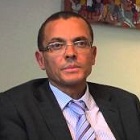
Mr. Corrreia Nunes has been working for over 26 years at the European Commission on various economic and development areas, including public finance management, coordination and monitoring of fiscal policies, debt sustainability analysis, domestic revenue mobilisation, macroeconomic analysis, formulation of development and trade policies, including inclusive growth and poverty reduction strategies, and support to regional integration. He worked in Mozambique and Zambia for the European Commission. In his last position in EC HQ, he was Head of “Budget Support and Public Finance Management” in EuropeAid, European Commission. He is currently Head of Development Cooperation of the EU Delegation to Tanzania and the East African Community, and is responsible for the overall formulation, coordination and implementation of the EU development cooperation with Tanzania and EAC. He is a former Lecturer in Macroeconomics at University of Laval, Quebec, Canada and worked for 6 years in the Ministry of Revenue and Ministry of Finance in Quebec, Canada. He holds a M.A. and a Ph.D degree in Economics from the University of Montréal and the University of Laval in Quebec, Canada, with Economic Theory, Econometrics, International Economics, and Economic Development as his specialization fields.
- Mr. Mario Mansour, Deputy Division Chief, Fiscal Affairs Department, IMF
-

Mr. Mario Mansour is Deputy Chief, Tax Policy Division of the Fiscal Affairs Department of the International Monetary Fund. Before joining the IMF in 2004, he managed tax advisory projects in the Middle East and Eastern Caribbean islands for a consultancy (2000-03), and was a tax analyst at the Canadian Federal Department of Finance (1992-2000), where he started his career specializing in business and international taxation, and modeling the fiscal and economic impacts of tax policy. Mario has advised on taxation in over 30 countries, and written on a wide range of tax issues. His recent publications dealt with tax policy in the Middle East and Africa, including how oil-rich countries should approach tax design, tax coordination in West Africa, the impact of major tax reforms on revenue mobilization in Sub-Saharan Africa, and fiscal stabilization in the oil and gas sector.
Objective: Discuss what should be done to accelerate the elimination of non-tariff barriers and implement the single customs territory, and what should be the scope of tax harmonization to ensure a level playing field in the common market.
Panel discussion: 55 minutes
Q&A with conference participants: 35 minutes
|
| 15:30 |
Coffee Break
|
| 16:00 |
Session 4: Financial Sector Integration: What Are the Key Goals and Challenges?
Moderator:
- Mr. Jean Ciza, Governor, Bank of the Republic of Burundi, Burundi
-
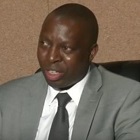
Governor Jean Ciza was born in 1966, in Muhanga Commune, in Kayanza. Governor Ciza holds Bachelor Degree in economics earned at the University of Burundi in 1994. Governor. Ciza has extensive experience in the banking sector: Customer Relations Officer at INTERBANK Burundi (1999 – 2001), Branch Manager of various branches in INTERBANK Burundi (2002 – 2005), Managing Director of the National Bank for Economic Development - BNDE (January 2006 – July 2007) and Managing Director of the Burundi Commercial Bank, BANCOBU (August 2007 – August 2012). Earlier in his career, Governor Ciza worked at NGOs: Project Officer at AFRICARE Burundi, a USAID project (1997 – 1998), Project Officer for BEST/USAID projects (1995 – 1996). Governor Ciza was appointed as Governor of the “Banque de la République du Burundi” on August 9th 2012. Governor Ciza is married.
Panelists:
- Mr. Paul Mathieu, Advisor, Monetary and Capital Markets Department, IMF
presentation
-
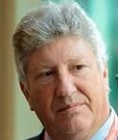
Mr. Paul Mathieu is the Advisor for the Monetary and Capital Markets Department of the IMF. He has led a number of financial stability assessment programs (FSAP) in Africa and Asia, been mission chief for Burundi, Ethiopia, Mauritius, and the Seychelles, and led special work on the emergence of Pan-African banks and on the financial sector regulatory and supervisory architecture for the EAC. His work has covered post-conflict, crisis management, debt restructuring and financial sector issues. He also has extensive work experience in transition economies. He holds a Bachelor’s degree from Concordia University in Montréal, Canada and a PhD in economics from the Graduate Institute of International Studies in Geneva, Switzerland.
- Prof. Benno Ndulu, Governor, Bank of Tanzania, Tanzania
-
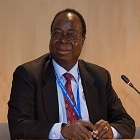
Prof. Ndulu was appointed central bank governor in 2008 and has since worked to rebuild public trust and confidence in Tanzania's central bank. He has presided over strong economic growth averaging 7 percent a year while bringing down the annual inflation rate to single digit levels from a peak of 20 percent in December 2011. Prof. Ndulu is credited with implementing prudent policies and overseeing macroeconomic stabilization that have underpinned Tanzania's strong economic performance over the past five years. He has supported the expansion of financial inclusion by licensing more commercial banks, helping introduce agent banking and tapping into the growth of mobile financial services. Under his stewardship, the central bank has licensed the country's first two credit reference bureaux in a bid to reduce risks of lending and boost credit to the private sector. Prof. Ndulu has a doctorate from Northwestern University in the United States and was deputy governor for less than a year before he was appointed governor. He previously worked for the World Bank's macroeconomic division covering east Africa. He has taught economics at the University of Dar es Salaam and helped set up the think tank African Economic Research Consortium. His research and teaching work covers macroeconomics, regional integration, trade and investments.
- Mr. James Mwangi, Managing Director and CEO, Equity Group Holdings Ltd., Kenya
-
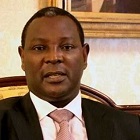
Mr. James Mwangi is the Chief Executive Officer and Managing Director of Equity Bank Group and the Executive Chairman of Equity Group Foundation. James holds five honorary doctorate degrees in recognition of his contributions to the Kenyan society. He holds a Bachelor of Commerce degree and is a Certified Public Accountant. James has been honored twice with Presidential national awards. He was vested the First Class Chief of the Order of the Burning Spear national decoration - the highest presidential award to a civilian - for outstanding contributions in economic development. He was also named the World Entrepreneur of the Year by Ernst & Young in 2012, and the Forbes Africa Person of the Year in 2012. He is currently the Chairman of Kenya’s Vision 2030 Delivery Board charged with the responsibility of ensuring Kenya becomes a middle income country with global high standards of living by the year 2030. He serves on several international bodies as an advisor. He is a Board Member of the Africa Leadership Academy in South Africa, the Global Alliance for Food Security and Nutrition among others and is the Chancellor of Meru University College of Science and Technology. James has extensive experience in the banking industry and inclusive finance.
- Mr. Paul Muthaura, Acting CEO of the Capital Markets Authority, Kenya
-
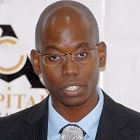
Mr Paul Murithi Muthaura has led the Capital Markets Authority, Kenya since July 2012.
Mr. Muthaura is a member of the Board of the International Organization of Securities Commissions (IOSCO) and the Vice Chairman of the Africa and Middle East Regional Committee (AMERC) of IOSCO. He is also a member of the Financial Stability Board (FSB) Regional Consultative Group for Sub-Saharan Africa and the Consultative Committee of the East African Securities Regulatory Authorities (EASRA). At the national level he sits on the boards of the Insurance and Pensions regulator as well as the Vision 2030 Delivery Board.
Mr. Muthaura has previously worked as an Emerging Markets Advisor with the General Secretariat of the International Organization of Securities Commissions (IOSCO) and as a senior commercial associate with the law firm of Daly and Figgis Advocates. In his time with the CMA he has held the positions of Head of Legal Framework, Head of Enforcement and Director, Regulatory Policy and Strategy.
Mr. Muthaura is an Advocate of the High Court of Kenya and is the holder of an LL.B from the University of Warwick, LLM in Banking and Finance Law from the London School of Economics and Political Science, MPhil from the Maastricht School of Management and is undertaking a DBA at the Maastricht School of Management.
Objective: Discuss financial sector integration in the EAC as part of the common market agenda. The process has started with Kenyan banks expanding their presence in the region. Other developments include increasing cross-border investments in financial markets and the rapid growth of mobile banking, with cross-border operations likely to increase too. Discussion will focus on the appropriate pace of financial integration, in light of benefits and risks, and what regulatory and supervisory steps should be taken to address these risks.
Panel discussion: 55 minutes
Q&A with conference participants: 35 minutes
|
| 17:30 |
Key Takeaways from Day 1
- Mr. Roger Nord, Deputy Director, African Department, IMF
-

Mr. Roger Nord is a national of the Netherlands. Currently Deputy Director of the IMF’s African Department, he oversees country operations in East Africa and francophone West Africa. He also leads the work on public finance issues in Africa. Previously, he was IMF mission chief for several African countries, including Tanzania, Uganda, Cameroon, and Gabon. Among his recent publications, he was the lead author of Tanzania – The Story of an African Transition (2009). Before joining the African Department, he was advisor to IMF Managing Director Horst Köhler and the IMF’s regional representative in Central Europe. He is a graduate of the University of St. Gallen, Switzerland, and of the University of Chicago.
|
| 17:45 |
Concluding Remarks
|
| 18:30 |
Reception/Dinner
Attendees: All conference participants
|
20:00
|
Keynote Address: Lessons from the Euro Area
Speaker:
- Professor Maurice Obstfeld, Economic Counsellor and Director, Research Department, IMF
presentation
-

Maurice Obstfeld was born in New York City in 1952. Since September 2015, he has been the Economic Counsellor and Director of Research at the International Monetary Fund, on leave from the University of California, Berkeley. At Berkeley, he is the Class of 1958 Professor of Economics and formerly Chair of the Department of Economics (1998-2001). He arrived at Berkeley in 1991 as a professor, following permanent appointments at Columbia (1979-1986) and the University of Pennsylvania (1986-1989), and a visiting appointment at Harvard (1989-90). He received his Ph.D. in economics from MIT in 1979 after attending the University of Pennsylvania (B.A., 1973) and King’s College, Cambridge University (M.A., 1975).
From July 2014 to August 2015, Dr. Obstfeld served as a Member of President Obama’s Council of Economic Advisers. He was previously (2002-2014) an honorary advisor to the Bank of Japan's Institute of Monetary and Economic Studies. He is a Fellow of the Econometric Society and the American Academy of Arts and Sciences. Among Dr. Obstfeld's honors are Tilburg University’s Tjalling Koopmans Asset Award, the John von Neumann Award of the Rajk Laszlo College of Advanced Studies (Budapest), and the Kiel Institute’s Bernhard Harms Prize. He has given a number distinguished lectures, including the American Economic Association’s annual Richard T. Ely Lecture, the L. K. Jha Memorial Lecture of the Reserve Bank of India, and the Frank Graham Memorial Lecture at Princeton. Dr. Obstfeld has served both on the Executive Committee and as Vice President of the American Economic Association. He has consulted and taught at the IMF and numerous central banks around the world.
He is also the co-author of two leading textbooks on international economics, International Economics (10th edition, 2014, with Paul Krugman and Marc Melitz) and Foundations of International Macroeconomics (1996, with Kenneth Rogoff), as well as more than 100 research articles on exchange rates, international financial crises, global capital markets, and monetary policy.
Objective: Reflect on the euro area experience (on the convergence process and on the experience with the recent crisis) and draw lessons for the governance and stability of currency areas to inform reforms on the way to the EAMU.
Speech: 30 minutes
Open discussion: 30 minutes
|
| DAY 2: ROAD TOWARD A MONETARY UNION |
| 9:00 |
Session 5: Macroeconomic Convergence: What Does It Mean Exactly, Why Is It Needed, and What Are the Priorities?
Moderator and Panelist:
- Dr. Patrick Njoroge, Governor, Central Bank of Kenya, Kenya
-
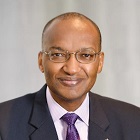
Dr. Patrick Njoroge was appointed Governor of the Central Bank of Kenya (CBK) on June 19, 2015. He is the first CBK Governor to be recruited through a competitive selection process that included vetting and approval by Parliament. In this capacity as Governor, Dr. Njoroge is the Chief Executive Officer (CEO) of the CBK, a member of the Board of Directors, and Chairman of the Monetary Policy Committee (MPC).
Dr. Njoroge has worked at the International Monetary Fund (IMF) in Washington DC, in various capacities for over 20 years. Prior to his appointment as Central Bank Governor, he was Advisor to the IMF Deputy Managing Director, a position he had held since December 2012. In this capacity, his responsibilities included assisting in overseeing the IMF’s engagement with IMF member countries. He also served as Deputy Division Chief in the IMF’s Finance Department between 2006 and 2012, IMF’s Mission Chief for the Commonwealth of Dominica between 2005 and 2006, and in other capacities since 1995. Previously, he had worked in Kenya as an Economist at the Ministry of Finance, and as a Planning Officer at the Ministry of Planning.
Dr. Njoroge joined the CBK at a time of considerable instability in the economy, including rising inflation and unhinged inflation expectations, a rapidly weakening currency amid concerns over the current account deficit, and high interest rates. Under his stewardship, the CBK moved decisively to deal with these issues, by adopting a tighter monetary policy stance, improving liquidity management, and strengthening market discipline. The CBK also had to deal with problems that emerged in three non-systemic banks. Dr. Njoroge remains keen to further strengthen the Kenyan banking sector through the adoption of “the New Normal” underpinned by greater transparency, stronger governance, and effective business models to boost the resilience of banks, reduce costs and support innovation.
Dr. Njoroge was named Africa’s Governor of the Year 2016 by African Banker Awards during the African Development Bank Group (AfDB) Annual Meetings in May 2016.
Dr. Njoroge holds a PhD degree in Economics from Yale University, in addition to Masters and Bachelor’s degrees Economics from the University of Nairobi.
Dr. Njoroge’s professional and research interests are in the areas of macroeconomics, international finance, development economics, econometrics and monetary policy.
Panelists:
- Mr. Roger Nord, Deputy Director, African Department, IMF
presentation
-

Mr. Roger Nord is a national of the Netherlands. Currently Deputy Director of the IMF’s African Department, he oversees country operations in East Africa and francophone West Africa. He also leads the work on public finance issues in Africa. Previously, he was IMF mission chief for several African countries, including Tanzania, Uganda, Cameroon, and Gabon. Among his recent publications, he was the lead author of Tanzania – The Story of an African Transition (2009). Before joining the African Department, he was advisor to IMF Managing Director Horst Köhler and the IMF’s regional representative in Central Europe. He is a graduate of the University of St. Gallen, Switzerland, and of the University of Chicago.
- Mr. Louis Marc Ducharme, Director, Statistics Department, IMF
presentation
-
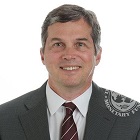
Mr. Louis Marc Ducharme was appointed Director of the IMF’s Statistics Department on June 17, 2013. Before joining the IMF, he spent 30 years at Statistics Canada where he held various positions in the area of economic statistics. His last tenure was Assistant Chief Statistician responsible for all economic statistics. During his career he provided extensive technical assistance to a number of countries in Latin America. He also taught macroeconomics at the Graduate School of Public and International Affairs at the University of Ottawa. He has a D. Phil in Economics and Science Policy from the University of Sussex, United Kingdom, and both a Master’s and Bachelor’s Degree in Economics from the University of Montreal in Canada.
- Dr. Albert Musisi, Commissioner, Ministry of Finance, Planning, and Economic Development, Uganda
-
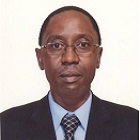
Aldret Albert Musisi holds a PhD in Development Economics from the Institute of Social Studies of Erasmus University Rotterdam, The Netherlands. He has considerable experience in Economic Development Policy, Macroeconomic Policy, and Poverty Analysis.
He was the Commissioner for Economic Development Policy and Research in the Ministry of Finance, Planning and Economic Development in Uganda but is currently the Commissioner for the Macroeconomic Policy in the same Ministry. Prior to this, he worked with the Poverty Reduction and Economic Management (PREM), anchor unit of the World Bank in Washington D.C. USA on secondment. As a member of the Poverty Reduction and Economic Management (PREM) anchor unit (PRMPR), at the World Bank, he worked on the Iraq Poverty Reduction Strategy Paper (PRSP), aid unpredictability and its influence on service delivery, and participated in the study on monitoring and evaluation systems in poor countries.
He is a member of the Board of Directors of the Uganda Bureau of Statistics and the Uganda Industrial Research Institute (UIRI).
His other key accomplishments include the following:
Uganda’s Development Strategy 2010/11 – 2014/15 – Prepared the background development strategy paper for Uganda’s National Development Plan (NDP) (2010/11 – 2014/15) and played a leading role in the compilation of the Plan.
Poverty Analysis – Acted as a Government counterpart in the coordination of Poverty Eradication Project (CPEP) and the Uganda Participatory Poverty Assessment Project (UPPAP). Outputs from these projects were important inputs into Uganda’s Poverty Eradication Action Plans (PEAPs).
He currently leads the Uganda government team negotiating with other East African Countries to ensure the implementation of the East African Monetary Union.
- Mr. Yusuf Murangwa, Director General, National Institute of Statistics, Rwanda
-

Mr. Murangwa Yusuf is the Director General of the National Institute of Statistics of Rwanda (NISR) since 2009. He is a professional statistician and operational researcher with about 15 years of experience in statistics. He holds a Master of Science degree in Operational Research and Applied Statistics from Cardiff University UK and a Bachelor of Science in statistics from Makerere University in Kampala. He has worked on a wide scope of statistics including: labor, education, health, prices, national accounts, agriculture, population statistics, poverty statistics to mention but a few. He joined the NISR in 2006 as a labor statistics expert coming from the Ministry of Public Service and Labor. In 2008 he was appointed Director of economic statistics at NISR. Over 2008-09 he initiated reforms in economic statistics especially in measuring inflation, improving national accounts, introducing quarterly GDP, developing rural and agriculture statistics. As Director General of NISR since 2009, he has focused on building the capacity of the national statistics system in statistics production and has been a strong advocate of the use of statistical evidence in policy and decision making. His focus going forward is to develop administrative data systems and use of technology in statistics production to improve quality, timeliness and efficiency.
Objective: The purpose of the convergence process is to ensure that countries enter the monetary union without major disequilibria that could threaten its stability. Convergence of policies and data is also required in many areas (e.g., monetary policy frameworks and operations). This session will assess the status of macroeconomic convergence, identify immediate priorities in this area, and discuss what should be done to address them.
Panel discussion: 55 minutes
Q&A with conference participants: 35 minutes
|
10:30
|
Coffee Break
|
11:00
|
Session 6: Enforcing Common Rules: The Role of Institutions and Procedures
Moderator and Panelist:
- Mr. Sanjeev Gupta, Deputy Director, Fiscal Affairs Department, IMF
-

Mr. Sanjeev Gupta is Deputy Director of the Fiscal Affairs Department of the International Monetary Fund (IMF). He previously worked in its African and European Departments. Mr. Gupta has led IMF missions to some 25 countries in Africa, Asia, Europe and the Middle East. Prior to joining the IMF, he was a fellow of the Kiel Institute of World Economics, Germany; Professor in the Administrative Staff College of India, Hyderabad; and Secretary of the Federation of Indian Chambers of Commerce and Industry. Mr. Gupta has authored/coauthored over 150 papers on macroeconomic and fiscal issues, many of which are published in well-known academic journals, and authored/coauthored/coedited eleven books; the most recent books, all published by the IMF, are "The Economics of Public Health Care Reform in Advanced and Emerging Economies," 2012; "Energy Subsidy Reform: Lessons and Implications," 2013; “Equitable and Sustainable Pensions: Challenges and Experiences,” 2014 and “Fiscal Policy and Inequality” September 2015.
Panelists:
- Prof. Christopher Adam, Lead Academic, International Growth, Center, Tanzania
-

Professor Christopher Adam is Professor of Development Economics and Head of Department in International Development at the University of Oxford, UK. He is the Lead Academic for Tanzania for the Oxford-LSE International Growth Centre (IGC). He is a Fellow of the European Development Network (EUDN), Visiting Professor at the University of Clermont-Ferrand, France, and a Visiting Scholar at the Research Department of the International Monetary Fund (IMF) in Washington D.C.
In 2011-12 he served as Specialist Advisor to the House of Lords Economic Affairs Committee Inquiry into the Effectiveness of UK Development Aid. From 2006-16 he was Vice-Chair of the Board of the African Economic Research Consortium, representing DFID.
His research is principally concerned with macroeconomic theory and policy in low-income countries, especially those of Sub-Saharan Africa. Most recently, this work has concentrated on the analysis of monetary, exchange rate and fiscal policy in ‘post-stabilization’ countries. An undergraduate at the University of St Andrews, Scotland, he also holds an M.Phil. and D.Phil. in Economics from Nuffield College, Oxford.
- Mr. John Rwangombwa, Governor, National Bank of Rwanda, Rwanda
-
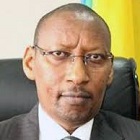
Mr. John Rwangombwa was appointed Central Bank Governor on the 25th February 2013. His career started in Rwanda Revenue Authority where he grew through the ranks to be Deputy Commissioner of Customs for Operations. He joined the Ministry of Finance and Economic Planning in 2002 as the Director of the National Treasury Department. Having served as the Ministry’s first Accountant General in 2005, Mr. Rwangombwa was appointed Permanent Secretary and Secretary to the Treasury in the same year, and in 2009 he became the Minister of Finance and Economic Planning. In 2012, he was voted Sub-Saharan Africa Finance Minister of the year by Emerging Markets Magazine. At that time, he oversaw the elaboration and implementation of Rwanda’s 1st Economic Development and Poverty Reduction Strategy (EDPRS I). In just two years at the helm of the Central Bank, Mr. Rwangombwa has been able to maintain the stability of the Rwandan Economy and its Financial Sector. Mr. Rwangombwa serves member of various advisory bodies including the Presidential Advisory Council and WEF Global Agenda Council.
- Dr. Patrick Njoroge, Governor, Central Bank of Kenya, Kenya
-

Dr. Patrick Njoroge was appointed Governor of the Central Bank of Kenya (CBK) on June 19, 2015. He is the first CBK Governor to be recruited through a competitive selection process that included vetting and approval by Parliament. In this capacity as Governor, Dr. Njoroge is the Chief Executive Officer (CEO) of the CBK, a member of the Board of Directors, and Chairman of the Monetary Policy Committee (MPC).
Dr. Njoroge has worked at the International Monetary Fund (IMF) in Washington DC, in various capacities for over 20 years. Prior to his appointment as Central Bank Governor, he was Advisor to the IMF Deputy Managing Director, a position he had held since December 2012. In this capacity, his responsibilities included assisting in overseeing the IMF’s engagement with IMF member countries. He also served as Deputy Division Chief in the IMF’s Finance Department between 2006 and 2012, IMF’s Mission Chief for the Commonwealth of Dominica between 2005 and 2006, and in other capacities since 1995. Previously, he had worked in Kenya as an Economist at the Ministry of Finance, and as a Planning Officer at the Ministry of Planning.
Dr. Njoroge joined the CBK at a time of considerable instability in the economy, including rising inflation and unhinged inflation expectations, a rapidly weakening currency amid concerns over the current account deficit, and high interest rates. Under his stewardship, the CBK moved decisively to deal with these issues, by adopting a tighter monetary policy stance, improving liquidity management, and strengthening market discipline. The CBK also had to deal with problems that emerged in three non-systemic banks. Dr. Njoroge remains keen to further strengthen the Kenyan banking sector through the adoption of “the New Normal” underpinned by greater transparency, stronger governance, and effective business models to boost the resilience of banks, reduce costs and support innovation.
Dr. Njoroge was named Africa’s Governor of the Year 2016 by African Banker Awards during the African Development Bank Group (AfDB) Annual Meetings in May 2016.
Dr. Njoroge holds a PhD degree in Economics from Yale University, in addition to Masters and Bachelor’s degrees Economics from the University of Nairobi.
Dr. Njoroge’s professional and research interests are in the areas of macroeconomics, international finance, development economics, econometrics and monetary policy.
Objective: Existing monetary unions have regional surveillance frameworks and institutions to ensure observance of regional rules. Enforcement of the common rules, however, has often proved difficult. This session will discuss lessons to be drawn from existing monetary unions, including for the new EAMU institutions.
Panel discussion: 55 minutes
Q&A with conference participants: 35 minutes
|
| 12:30 |
Lunch Break
|
14:00
|
Session 7: Concluding Roundtable on Policy Priorities for the EAC (Open to the Press)
Moderator:
- Mr. Abebe Aemro Selassie, Director, African Department, IMF
-

Mr. Abebe Aemro Selassie is the Director of the IMF’s African Department, with responsibility for the Fund’s operations and engagement with the 45 member countries from sub-Saharan Africa. He assumed this role in September 2016. Prior to this assignment, Mr. Selassie was Deputy Director of the Department. Between 2011 and 2013, he was in charge of the IMF’s work on Portugal under its IMF/EU/ECB-supported adjustment program (2011-13). From 2009 to 2011, he was the mission chief for South Africa, leading the Article IV discussions with the government, and Chief of the African Department’s Regional Studies Division. From 2006 to 2009, Mr. Selassie was the IMF’s Senior Resident Representative in Uganda. Earlier in his career, he worked on the Fund’s lending programs with Turkey (1999-2001), Thailand (1998-99), Romania (1997-98) and Estonia (1996-97) as well as taking part in extensive policy, operational review, and economic research work. Before joining the IMF in 1994, he worked for the Government of Ethiopia (1992-94) and the Economist Intelligence Unit in London (1991-92). An Ethiopian national, Mr. Selassie did his graduate studies at the London School of Economics.
Participants:
Amb. Jean Rigi, Permanent Secretary, Ministry for EAC Integration, Burundi
Ms. Betty Maina, Principal Secretary for East African Affairs, State Department of East Africa Affairs, Kenya
-
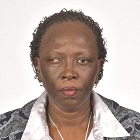
Ms. Betty Maina brings to the State Department a wealth of experience and professional capability built over two decades of engagement with top-notch public and private sector organizations. She has more than 20 years’ experience in organizational leadership and development, with an ability to prepare and implement strategic business plans and mobilize resources for implementation, traits that place her at a strategic position to effectively lead the coordination of East African Community integration in Kenya.
Ms. Maina was Chief Executive of the Kenya Association of Manufacturers for 11 years (between June 2014–July 2015), where she not only oversaw the doubling of membership of the association, but also established seven satellite offices to compliment the services offered at the national office. She was also behind the successful implementation of the association’s strategic plan, resource mobilization and fundraising and oversaw its revenue increase from Kshs 24 million to Kshs 400 million annually within her ten year stewardship.
Ms. Maina also has keen interest and experience in Trade Policy, Regional Integration, Private Sector Development, Industrial Development, Public Private Dialogue, Business and Society, Sustainable Development, Integrated development, Education, Corporate Sustainability, Government Relations and Advocacy.
She attained a Master of Science Degree in Development Administration and Planning from the University College of London in 1998, having studied Land Economics at the University of Nairobi where she attained her undergraduate degree in 1988. She has also undertaken short courses in several key areas, among them Budgeting and Financial Management (Harvard University), Developing Anti-Corruption Strategies (World Bank, Washington), Gender and Development Planning (University College of London), and the Role of Public Policy in Private Sector Development (Strathmore University College), to name just a few.
Regional integration, industrial development, private sector development, good governance and sustainable development are at the heart of Ms. Maina’s strategic approach to business, and her new role of coordinating EAC affairs in Kenya may not present a big challenge, going by her experience and trainings. Her achievements at KAM and other organizations earned her the Kenyan presidential honor in 2013, giving her the title: Moran of the Order of the Burning Spear (MBS).
Ms. Maina’s active professional journey started in 1997 when she became Chief Executive of the Institute of Economic Affairs in Kenya (IEA), an independent policy think-tank and advocacy, promoting public awareness on policy issues and advocating for the institution of socially responsive economic reforms, a position she held until 2003. Between 1996 and 1997, she was a consultant, Local Government Reform Program in Kenya, and formed part of a team investigating and suggesting alternative resource base enhancement for local authorities in Kenya, and which carried out revenue potential studies for Kisumu, Nakuru, Naivasha and Kakamega municipalities.
She was also team leader in program initiation for the Migori Integrated Urban Development Program between 1994 and 1996, and led a team that used participatory approaches to initiate an integrated urban development program in the town. During the same period, Ms Maina was also Gender Advisor, Arid and Semi-Arid Programs in (then) Keiyo and Marakwet districts (now Elgeyo Marakwet County).
She was Research Assistant, United Nations Center for Human Settlements (UN/Habitat) between 1991 and 1993, having served as Assistant Project Officer, Shelter Afrique (1990-91) where she initiated the company newsletter, ShelterNews.
Prior to joining the State Department, Ms. Maina was the Director of her consultancy firm: BECEM Solutions and East Africa Regional Representative of Genetics: Analytics, an economic consulting group with offices in Nairobi, New Delhi and Johannesburg.
- Mr. John Rwangombwa, Governor, National Bank of Rwanda, Rwanda
-

Mr. John Rwangombwa was appointed Central Bank Governor on the 25th February 2013. His career started in Rwanda Revenue Authority where he grew through the ranks to be Deputy Commissioner of Customs for Operations. He joined the Ministry of Finance and Economic Planning in 2002 as the Director of the National Treasury Department. Having served as the Ministry’s first Accountant General in 2005, Mr. Rwangombwa was appointed Permanent Secretary and Secretary to the Treasury in the same year, and in 2009 he became the Minister of Finance and Economic Planning. In 2012, he was voted Sub-Saharan Africa Finance Minister of the year by Emerging Markets Magazine. At that time, he oversaw the elaboration and implementation of Rwanda’s 1st Economic Development and Poverty Reduction Strategy (EDPRS I). In just two years at the helm of the Central Bank, Mr. Rwangombwa has been able to maintain the stability of the Rwandan Economy and its Financial Sector. Mr. Rwangombwa serves member of various advisory bodies including the Presidential Advisory Council and WEF Global Agenda Council.
- Mr. Stephen Dhieu Dau Ayik, Minister of Finance and Planning, South Sudan
-
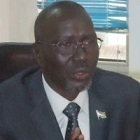
Mr. Stephen Dhieu Dau was born in Melut County, Upper Nile State. After completing his secondary school education in Renk secondary school (1982-1985), he was accepted at the University of Cairo, Egypt, where he studied and graduated with a Bachelor’s Degree in Commerce in 1990. He gained a Post Graduate Diploma in Banking from the Higher Institute of Financial Banking Studies, Khartoum in 1994, and a Master’s Degree in Banking Studies from the Sudan University of Science and Technology, Khartoum, in 2005.
Mr. Stephen Dhieu Dau is a career banker. He joined the Central Bank of Sudan in Khartoum in 1991, where he undertook several professional courses in various banking operations in the Gulf and UK. He progressed in the bank to a senior position in 2005, and was one of the few South Sudanese Central Bank officials to attained such a position.
Mr. Dhieu Dau provided technical support to the negotiating team the Sudan Peoples’ Liberation Movement (SPLM) on wealth sharing during the peace talks in Naivasha, Kenya during the negotiation of the Comprehensive Peace Agreement (CPA). He participated in the establishment of the two-window banking systems in the Sudan as stipulated by the CPA. More importantly, as one of the few SPLM members working in the Central Bank, he was a member of the CPA wealth sharing committee. He was also one of the bank officials that oversaw the currency transition from the dinar to the pound in 2005.
Government positions occupied: July 2016 – present: Minister of Finance and Economic Planning, April 2016 – July 2016: Minister of Trade and Industry, August 2011 – March 2016: Minister of Petroleum and Mining, 2009 – 2011: Minister of Trade and Commerce
- Prof. Benno Ndulu, Governor, Bank of Tanzania, Tanzania
-

Prof. Ndulu was appointed central bank governor in 2008 and has since worked to rebuild public trust and confidence in Tanzania's central bank. He has presided over strong economic growth averaging 7 percent a year while bringing down the annual inflation rate to single digit levels from a peak of 20 percent in December 2011. Prof. Ndulu is credited with implementing prudent policies and overseeing macroeconomic stabilization that have underpinned Tanzania's strong economic performance over the past five years. He has supported the expansion of financial inclusion by licensing more commercial banks, helping introduce agent banking and tapping into the growth of mobile financial services. Under his stewardship, the central bank has licensed the country's first two credit reference bureaux in a bid to reduce risks of lending and boost credit to the private sector. Prof. Ndulu has a doctorate from Northwestern University in the United States and was deputy governor for less than a year before he was appointed governor. He previously worked for the World Bank's macroeconomic division covering east Africa. He has taught economics at the University of Dar es Salaam and helped set up the think tank African Economic Research Consortium. His research and teaching work covers macroeconomics, regional integration, trade and investments.
- Dr. Louis Kasekende, Deputy Governor, Bank of Uganda, Uganda
-
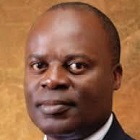
Dr Louis A. Kasekende is the Deputy Governor at the Bank of Uganda.
From May 2006 to 2009, he served as Chief Economist of the African Development Bank (AfDB). As Chief Economist, he was the Bank's spokesperson on socio-economic and development issues of importance for Africa, and is credited for playing a leading role in the AfDB’s efforts to help African economies withstand the impact of the global economic crisis.
Between 2002 and 2004, he served as Alternate Executive Director and later as Executive Director at the World Bank for Africa Group 1, including 22 countries mostly from Anglophone Sub-Saharan Africa.
Prior to joining the World Bank, he had worked for 17 years at the Bank of Uganda in several capacities, including as Director of Research Department, Executive Director responsible for Research and Policy and served as Deputy Governor between 1999 and 2002. He has previously served as a member of the United Nations Group of Eminent Persons for the Least Developed Countries and the World Bank Knowledge Advisory Commission.
Currently, Dr Kasekende is a Board Member of the African Export Import Bank (AFREXIMBANK), the International Economics Association (IEA) and the Africa Economic Research Consortium (AERC), and is a member of the National Steering Committee on Capital Markets Development in Uganda. Dr Kasekende holds a PhD in Econometrics from the University of Manchester. He has authored several articles in academic journals and books.
- Mr. Roeland van de Geer, Head, EU Delegation to Tanzania and the EAC
-

Ambassador Roeland van de Geer was born in Amsterdam, The Netherlands, on 19 February 1953. He graduated in Political Sciences and Public Administration from the Free University in Amsterdam (1970-1978). Aside from his diplomatic career, the Ambassador has a long relationship with Africa. He was previously a lecturer, research fellow and project manager of a Free University of Amsterdam Public Administration Research and Curriculum Development Project with the National University of Lesotho (February 1978-December 1980) and an advisor on local government and decentralization for the World Bank Maseru Urban Development Project in Lesotho (January 1981-January 1982). Before taking over his current position in February 2011, the Ambassador was the Special Representative of the European Union for the Great Lakes Region (since March 2007). Previously, he served as Ambassador of the Netherlands in Afghanistan (August 2006-February 2007) and Mozambique (September 1994-August 1998). Previous to his posting in Afghanistan, the Ambassador was Africa Director at the Ministry of Foreign Affairs of the Netherlands (February 2002-August 2005). He also held other positions in the Dutch Foreign Affairs Ministry with a focus on Africa: Head of the Southern Africa Division – Development (February 1991-August 1994); Head of the Middle East and Northern Africa Division (February 1990-January 1991); Head of the Southern Africa Division – Political (September 1984-December 1986); Desk Officer for South Africa, Botswana, Lesotho and Swaziland (February 1982-August 1984).
Objective: Summarize the main issues discussed during the conference, the policy and capacity development priorities needed to address them, and the role of external support.
Roundtable discussion: 60 minutes
Press conference and questions from the floor: 50 minutes
|
| 15:50 |
Concluding Remarks
Hon. Jesca Eriyo, Deputy Secretary General, Finance and Administration, EAC
|
| 16:00 |
Conference Closure
|
PRESS EVENT: IMPROVEMENTS IN EAST AFRICAN STATISTICS
THROUGH CAPACITY DEVELOPMENT |
16:30
16:35
17:00
|
Opening Remarks
Hon. Jesca Eriyo, Deputy Secretary General, Finance and Administration, EAC
Moderator: Mr. Yusuf Murangwa, Director General, National Institute of Statistics, Rwanda
Presentations by:
- Mr. Louis Marc Ducharme, Director, Statistics Department, IMF
presentation
-
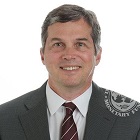
Mr. Louis Marc Ducharme was appointed Director of the IMF’s Statistics Department on June 17, 2013. Before joining the IMF, he spent 30 years at Statistics Canada where he held various positions in the area of economic statistics. His last tenure was Assistant Chief Statistician responsible for all economic statistics. During his career he provided extensive technical assistance to a number of countries in Latin America. He also taught macroeconomics at the Graduate School of Public and International Affairs at the University of Ottawa. He has a D. Phil in Economics and Science Policy from the University of Sussex, United Kingdom, and both a Master’s and Bachelor’s Degree in Economics from the University of Montreal in Canada.
- Dr. Albert Musisi, Commissioner, Ministry of Finance, Planning, and Economic Development, Uganda
-
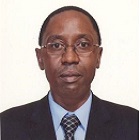
Aldret Albert Musisi holds a PhD in Development Economics from the Institute of Social Studies of Erasmus University Rotterdam, The Netherlands. He has considerable experience in Economic Development Policy, Macroeconomic Policy, and Poverty Analysis.
He was the Commissioner for Economic Development Policy and Research in the Ministry of Finance, Planning and Economic Development in Uganda but is currently the Commissioner for the Macroeconomic Policy in the same Ministry. Prior to this, he worked with the Poverty Reduction and Economic Management (PREM), anchor unit of the World Bank in Washington D.C. USA on secondment. As a member of the Poverty Reduction and Economic Management (PREM) anchor unit (PRMPR), at the World Bank, he worked on the Iraq Poverty Reduction Strategy Paper (PRSP), aid unpredictability and its influence on service delivery, and participated in the study on monitoring and evaluation systems in poor countries.
He is a member of the Board of Directors of the Uganda Bureau of Statistics and the Uganda Industrial Research Institute (UIRI).
His other key accomplishments include the following:
Uganda’s Development Strategy 2010/11 – 2014/15 – Prepared the background development strategy paper for Uganda’s National Development Plan (NDP) (2010/11 – 2014/15) and played a leading role in the compilation of the Plan.
Poverty Analysis – Acted as a Government counterpart in the coordination of Poverty Eradication Project (CPEP) and the Uganda Participatory Poverty Assessment Project (UPPAP). Outputs from these projects were important inputs into Uganda’s Poverty Eradication Action Plans (PEAPs).
He currently leads the Uganda government team negotiating with other East African Countries to ensure the implementation of the East African Monetary Union.
- Mr. Robert Maate, Head, Statistics Department, EAC Secretariat
-

Mr. Maate has extensive working experience at national and regional levels in the areas of statistics and macroeconomic policy research, formulation and coordination. He was Chief Coordinator of the High Level Task Force that negotiated and concluded the EAC Monetary Union Protocol (an agreement for adoption of a single currency among the EAC Member States). At present, he supports the implementation of the EAC Monetary Union Protocol. Mr. Maate is responsible for establishment of the East African Statistics Bureau (responsible for production and dissemination of reliable statistics in EAC). He has worked extensively on harmonization, production and dissemination of timely, reliable and regionally comparable socio-economic statistics necessary for the EAC integration agenda. He also spearheaded the development and implementation of the EAC Regional Statistics Development Plan and EAC Regional Statistics Policy, and previously worked at the Parliament of Uganda as a Senior Research Officer where he was responsible for undertaking legislative policy research and providing technical/professional advice to Committees of Parliament and to Members of Parliament. He has led research teams and scrutinized macroeconomic policy papers to inform macroeconomic policy formulation in Uganda at the national level. Mr. Maate is the holder of a M.Sc. degree in Financial Economics, as well as a Masters of Statistics, M.Sc. Finance and Investment, and a Masters of Management Studies degree.
Representatives of the EAC partner states
Q&A:
Objective: This event offers conference participants and the press an opportunity to become familiar with recent improvements in economic and financial statistics in EAC countries, through a capacity development program supported by the EAC Secretariat and the IMF. Particular attention will be paid to government finance statistics, which will play a key role in the monitoring of the convergence to the East African Monetary Union.
|
| 18:00 |
Cocktails/Dinner
Supported by the German Development Corporation
Welcoming Remarks:
- Amb. Egon Kochanke, Ambassador of the Federal Republic of Germany in Tanzania
-
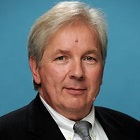
Egon Kochanke is currently the Ambassador of the Federal Republic of Germany to Tanzania. He served previously as the Director of the Department for Sub-Saharan Africa and the Sahel at the German Federal Foreign Office. In 1977, he completed his studies in history, political science, sociology and law at the University of Bonn. In 1980, he joined the Foreign Service, and after his traineeship as an attaché 1982 he was appointed as the Second Secretary at the German Embassy in Canada, and from 1985 to 1989 he held the post of Deputy Head of Mission in Liberia. After his return to Germany, he was a speaker in the Parliament and the Cabinet of the Foreign Office. During this time, he assisted in the United Nations’ election monitoring in Haiti in 1990 and 1991. This was followed with his position as a Counsellor and Representative to the European Union at the Germany Embassy in the United Kingdom. Until 1999, he was the Personal Secretary to State Secretary Peter Hartmann as well as Deputy Director of the Office of the Secretaries of the State. Upon completion of this activity, he was Deputy Head of Mission in Israel and from 2002 to 2005 the Head of the Export Control (dual-use goods in the non-conventional sector) at the German Foreign Office in Berlin. He then worked as an envoy and Head of the Economics Department at the German Embassy in the United States. From August 2008 to July 2012, Egon Kochanke was Ambassador of the Federal Republic of Germany to Namibia.
Attendees: All conference participants and the press corps.
|


































